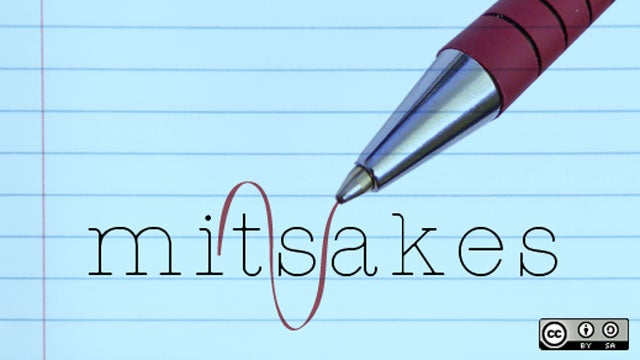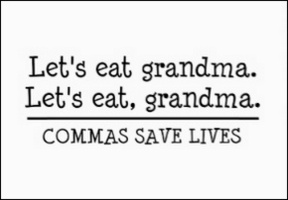So, here are more examples of grammar goofs that are commonly found in both texts and conversations.

1. Could of, Would of, Should of
Actually, the right ones are Could've, Would've, and Should've, which are the contractions of the words Could + have, Would + have, and Should + have. The cause of these mistakes are likely to be the pronunciation. The word "could've", when spoken, might sounds like it's ended by "of". So, be careful when you're listening to conversations or other people talking to you. If you fail to catch these words and what they mean, you will likely to be fail to understand them.

2. Complement / Compliment
Do not confuse these words. "Complement" means something that adds to something else, or an action of doing so (e.g.: The flavours in the dish complement each other perfectly.). While "compliment" means something nice that you say to other people to praise them (e.g.: 'You understand the problem because you're so much older.' 'I'll take that as a compliment!').

3. Fewer / Less
The meaning of these words might be the same, but there are some occasions where you can only use "fewer" or "less". Use "fewer" to say something countable which has a smaller number than the other (e.g.: I have fewer books than you). Use "less" to refer to something uncountable (e.g.: John has drunk less beer recently)

4. Many / Much
This is almost the same with number 3. Use "many" to refer to countable nouns, such as pencils and books (e.g.: I have many books). Use "much" to refer to uncountable nouns, such as milk, sugar, and honey (e.g.: I drank too much milk last night).

5. Principal / Principle
They're different, okay? So, don't get confused. Principal means the highest position of a person (e.g.: Jack, the school principal). This also means the most important thing in a subject (e.g.: New roads will link the principal cities.). Principle means moral rules or a strong belief that affects your actions. (e.g.: He has high moral principles)

6. The Dangling Participle
This occurs when you arrange a sentence in a confusing way.
Example:
Confusing sentence : After doing crimes for years, the police managed to catch the robbers.
(This sentence means that the police are the criminals who had caught robbers. Wait, what?)
Good sentence : The police managed to catch the robbers that had been doing crimes for years.

7. The Use of Commas
Commas, They can save lives. Why would I say that? Imagine, if you write a note to your grandmother like this:
"Let's eat Grandma!"
What will your grandmother's reaction be? Of course she will get terrified, scared, even will have a heart attack. Okay, that's way too far.
Anyway, how if you put a single comma there? Like this:
"Let's eat, Grandma!"
Her reaction will be so much better, and she will make you dishes to eat. Much better, right? That's because, commas are used to seperate items, words, and phrases. Commas can change the meaning and context drastically. So, be careful with your sentences. Always consider whether you need commas or not, in your sentences. Also consider about where to put them, because if you place it on the wrong place, the context and the meaning will be different.

So, that's all for now. Actually, there are many grammar mistakes that will make you look like a fool. So, be aware! Keep exploring! You can find most of them on the internet. See you~
sources:
http://www.copyblogger.com/grammar-goofs/
http://i.kinja-img.com/gawker-media/image/upload/s--Pc4lb7qJ--/18ix62olhq1s7jpg.jpg
https://s-media-cache-ak0.pinimg.com/236x/ba/a7/ef/baa7ef1a23449f7cbf52035e31f3ee20.jpg
http://pad3.whstatic.com/images/thumb/5/55/Tell-the-Difference-Between-Complement-and-Compliment-Step-3.jpg/670px-Tell-the-Difference-Between-Complement-and-Compliment-Step-3.jpg
http://jobjenny.squarespace.com/storage/fewer%20less.bmp?__SQUARESPACE_CACHEVERSION=1280425149939
http://www.skypeenglishclassnow.com/s/cc_images/cache_1463500.png?t=1389997278
http://cdn2-b.examiner.com/sites/default/files/styles/image_content_width/hash/69/83/6983efd99a159df465892a136752acb9.jpg?itok=R8rSloZ3
http://penultimateword.com/wp-content/uploads/2013/11/lets_eat_grandma_commas_save_lives1.jpg
http://24.media.tumblr.com/tumblr_mb43pmjVqE1rnvzfwo1_500.gif
Oxford advanced learner's dictionary - 8th edition
No comments:
Post a Comment